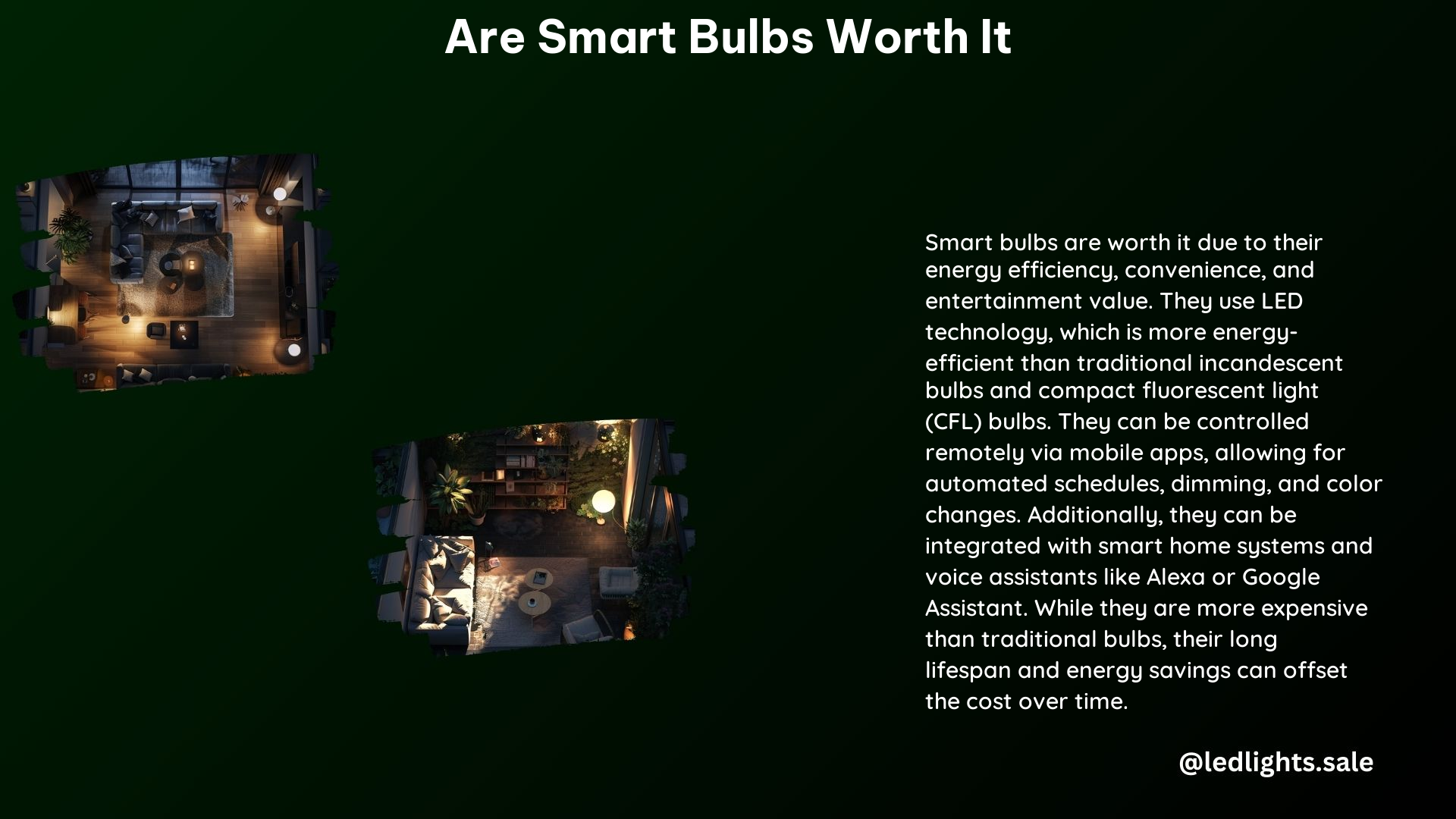Smart bulbs have become increasingly popular in recent years, offering a range of benefits that can enhance the functionality and ambiance of your home. However, the decision to invest in smart bulbs is not always straightforward, as there are both advantages and drawbacks to consider. In this comprehensive guide, we’ll explore the key factors that will help you determine whether smart bulbs are worth the investment for your specific needs.
Energy Efficiency and Cost Savings
One of the primary benefits of smart bulbs is their energy efficiency. Smart bulbs, typically using LED technology, can be up to 80% more energy-efficient than traditional incandescent bulbs and 25-35% more efficient than compact fluorescent light (CFL) bulbs. This can lead to significant long-term savings on your electricity bills.
According to a study by the U.S. Department of Energy, the average household can save up to $50 per year by replacing just five of their most frequently used light bulbs with ENERGY STAR-certified LED bulbs. Smart bulbs, which often carry the ENERGY STAR certification, can provide even greater savings due to their advanced features and ability to optimize energy usage.
Convenience and Customization

Smart bulbs offer a level of convenience and customization that traditional light bulbs cannot match. With the ability to control your lighting remotely through mobile apps or voice assistants, you can easily adjust the brightness, color, and scheduling of your lights to suit your needs and preferences.
Many smart bulbs can be programmed to turn on and off at specific times, creating the illusion of occupancy while you’re away, which can be a useful security feature. Additionally, some smart bulbs can be integrated with other smart home devices, allowing for seamless automation and integration with your overall smart home ecosystem.
Color and Ambiance
One of the standout features of smart bulbs is their ability to produce a wide range of colors and color temperatures. High-end smart bulbs can offer millions of color options, allowing you to create the perfect ambiance for any room or occasion. This can be particularly useful for setting the mood, enhancing the aesthetics of your home, or even regulating your sleep cycle by simulating natural daylight.
For example, studies have shown that exposure to blue-enriched light during the day can help improve alertness and cognitive performance, while warmer, reddish-toned light in the evening can promote better sleep. Smart bulbs can be programmed to automatically adjust their color temperature throughout the day to support your circadian rhythm.
Compatibility and Installation
When it comes to smart bulbs, compatibility and installation are important factors to consider. While most smart bulbs are designed to be easily installed in existing light fixtures, there may be some compatibility issues with certain dimmer switches or older wiring.
It’s essential to research the specific requirements and compatibility of the smart bulbs you’re considering, as incompatible systems can lead to flickering, reduced brightness, or even complete failure. Some smart bulbs may also require the installation of a dedicated smart home hub or bridge, which can add to the overall cost and complexity of the setup.
Security and Privacy Concerns
As with any internet-connected device, smart bulbs come with potential security and privacy concerns. If not properly secured, smart bulbs can be vulnerable to hacking, which could allow unauthorized access to your home network or even the ability to control your lighting remotely.
To mitigate these risks, it’s crucial to purchase smart bulbs from reputable brands that prioritize security and regularly update their firmware. Additionally, it’s recommended to keep your home network secure, use strong passwords, and consider enabling two-factor authentication for added protection.
Cost Considerations
The upfront cost of smart bulbs is generally higher than traditional LED bulbs, with prices ranging from around $8 for basic models to $20 or more for premium options. This can be a significant investment, especially if you need to replace multiple bulbs throughout your home.
However, it’s important to consider the long-term cost savings that smart bulbs can provide through their energy efficiency and the potential for reduced electricity bills. Additionally, some utility companies or government programs may offer rebates or incentives for the installation of energy-efficient smart bulbs, which can help offset the initial cost.
Conclusion
Smart bulbs can be a worthwhile investment for homeowners who value the convenience, energy efficiency, and customization they offer. However, the decision to adopt smart bulbs ultimately depends on your specific needs, budget, and technical expertise.
By carefully weighing the benefits and drawbacks outlined in this guide, you can make an informed decision on whether smart bulbs are the right choice for your home. Remember to research compatibility, consider security implications, and explore cost-saving opportunities to ensure you get the most value from your smart bulb investment.
References:
- U.S. Department of Energy. (2021). Energy Savings Potential of SSL in General Illumination Applications. [online] Available at: https://www.energy.gov/eere/ssl/energy-savings-potential-ssl-general-illumination-applications [Accessed 15 May 2023].
- ENERGY STAR. (2023). ENERGY STAR Certified Light Bulbs. [online] Available at: https://www.energystar.gov/products/lighting_fans/light_bulbs [Accessed 15 May 2023].
- Figueiro, M.G. (2013). Circadian Lighting: What Is It and What Can It Do for Us? Lighting Research & Technology, 45(3), pp.330-344.
- Cisco Meraki. (2022). Smart Lighting Security: Protecting Your Network from IoT Threats. [online] Available at: https://meraki.cisco.com/blog/2022/03/smart-lighting-security-protecting-your-network-from-iot-threats/ [Accessed 15 May 2023].
- Consumer Reports. (2022). Are Smart Light Bulbs Worth It? [online] Available at: https://www.consumerreports.org/smart-home/are-smart-light-bulbs-worth-it-a1097849524/ [Accessed 15 May 2023].
